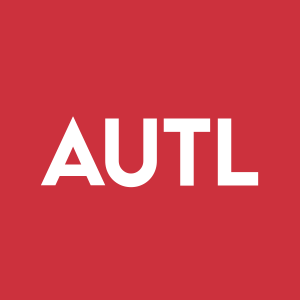Autolus Therapeutics Presents Clinical Data Update at the Society of Hematologic Oncology (SOHO) Annual Meeting 2024
Rhea-AI Summary
Autolus Therapeutics (Nasdaq: AUTL) presented clinical data on obecabtagene autoleucel (obe-cel) for relapsed/refractory adult B-cell acute lymphoblastic leukemia (r/r B-ALL) at the SOHO Annual Meeting 2024. The FELIX Phase Ib/II study utilized a tumor burden (TB)-guided dosing strategy, resulting in high CAR T-cell expansion and manageable adverse events.
Key findings:
- 94% of patients received two planned doses
- Overall remission rates: 90% (low TB) and 75% (high TB)
- Peak expansion reached after Dose 2 in both groups
- 50% TB increase associated with 1.754-fold Cmax increase and 2.068-fold AUC0-28days increase
The data support the TB-guided dosing approach in adult r/r B-ALL, highlighting obe-cel's differentiation based on its unique binding properties.
Positive
- High overall remission rates: 90% in low TB group, 75% in high TB group
- 94% of patients received the planned two doses of obe-cel
- High CAR T-cell expansion observed, increasing with tumor burden
- TB-guided dosing strategy resulted in manageable adverse event profile
- Peak expansion reached after Dose 2 in both low and high TB groups, demonstrating the need for both doses
Negative
- Lower remission rate (75%) in high tumor burden group compared to low tumor burden group (90%)
News Market Reaction – AUTL
On the day this news was published, AUTL declined 1.01%, reflecting a mild negative market reaction.
Data tracked by StockTitan Argus on the day of publication.
- Tumor Burden (TB)-guided dosing strategy, together with the unique fast off-rate binder of obe-cel, resulted in substantial response and low incidence of Grade ≥3 immunotoxicity
- TB-guided dosing of obe-cel in the FELIX Phase Ib/II study demonstrated high CAR T-cell expansion
- Peak expansion was reached after Dose 2 in both low and high TB groups, demonstrating the positive effect from both doses of obe-cel, irrespective of TB at lymphodepletion
LONDON, Aug. 27, 2024 (GLOBE NEWSWIRE) -- Autolus Therapeutics plc (Nasdaq: AUTL), a clinical-stage biopharmaceutical company developing next-generation programmed T cell therapies, announces a poster presentation at the Society of Hematologic Oncology (SOHO) Annual Meeting being held September 4-7, 2024 in Houston, Texas. These data demonstrate the rationale for tumor burden (TB)-guided dosing in adult patients with Relapsed/Refractory B-Cell Acute Lymphoblastic Leukemia (r/r B-ALL) by analyzing the impact of bone marrow (BM) blast percentage prior to lymphodepletion in patients treated with obe-cel in the FELIX Phase 1b/2 study.
“Unlike other CD19 CAR T-cell therapies, obe-cel is administered to patients as two infusions using a tumor burden-guided dosing schedule,” said Dr. Christian Itin, Chief Executive Officer of Autolus. “The data demonstrate the importance of administering both split doses of obe-cel to patients with r/r B-ALL and highlight the differentiation of obe-cel based on its unique binding properties and tumor burden-guided dosing approach.”
Poster presentation:
Title: Obecabtagene autoleucel (obe-cel) for Relapsed/Refractory Adult B-Cell Acute Lymphoblastic Leukemia (r/r B-ALL): Impact of Chimeric Antigen Receptor T-Cell (CAR T) and Tumor Burden-Guided Dosing in the FELIX Phase 1b/2 Study
Session date and time: Wednesday, September 4, 6:15 pm
Session room: Hall B3
Poster Number: ALL-502
Presenting Author: Dr. Elias Jabbour, Professor, Department of Leukemia, Division of Cancer Medicine, MD Anderson Cancer Center, Houston, TX
Summary:
Tumor burden (TB) is a recognized driver of immunotoxicity from CAR T therapy for B-ALL. Obe-cel is a novel autologous CAR T with a differentiated fast off-rate CD19 binding domain and a 4-1BB co-stimulatory domain, designed to improve CAR T persistence and immunotoxicity. Obe-cel is an investigational therapy being evaluated in adult r/r B-ALL in the FELIX Phase Ib/II study (NCT04404660), utilizing TB-guided dosing based on bone marrow (BM) blast percentage prior to lymphodepletion. We report outcomes by TB, demonstrating the rationale for TB-guided dosing in adult r/r B-ALL.
Of 127 patients infused with obe-cel, 120 (
In summary, TB-guided dosing was associated with high CAR-T cell expansion and while providing a manageable adverse event profile. This supports the TB guided-dosing approach in adult r/r B-ALL.
About Autolus Therapeutics plc
Autolus is a clinical-stage biopharmaceutical company developing next-generation, programmed T cell therapies for the treatment of cancer and autoimmune disease. Using a broad suite of proprietary and modular T cell programming technologies, Autolus is engineering precisely targeted, controlled and highly active T cell therapies that are designed to better recognize target cells, break down their defense mechanisms and eliminate these cells. Autolus has a pipeline of product candidates in development for the treatment of hematological malignancies, solid tumors and autoimmune diseases. For more information, please visit www.autolus.com
About obe-cel (AUTO1)
Obecabtagene autoleucel (obe-cel) is a B-lymphocyte antigen CD19 (CD19) chimeric antigen receptor (CAR) T cell investigational therapy designed to overcome the limitations in clinical activity and safety compared to current CD19 CAR T cell therapies. Obe-cel is designed with a fast target binding off-rate to minimize excessive activation of the programmed T cells. In clinical trials of obe-cel, this “fast off-rate” profile reduced toxicity and T cell exhaustion, resulting in improved persistence and leading to high levels of durable remissions in relapsed/refractory (r/r) Adult B-cell Acute Lymphoblastic Leukemia (B-ALL) patients. The results of the FELIX trial, a pivotal trial for adult B-ALL, have been submitted and accepted by the FDA with a PDUFA target action date of November 16, 2024. In the EU a regulatory submission to the EMA was accepted in April 2024, while in the UK, an MAA was submitted to MHRA in July 2024. In collaboration with Autolus’ academic partner, University College London, obe-cel is currently being evaluated in a Phase 1 clinical trial for B-cell non-Hodgkin lymphoma (B-NHL).
About obe-cel FELIX clinical trial
Autolus’ Phase 1b/2 clinical trial of obe-cel enrolled adult patients with r/r B-precursor ALL. The trial had a Phase 1b component prior to proceeding to the single arm, Phase 2 clinical trial. The primary endpoint was overall response rate, and the secondary endpoints included duration of response, MRD negative complete remission rate and safety. The trial enrolled over 100 patients across 30 of the leading academic and non-academic centers in the United States, United Kingdom and Europe. [NCT04404660]
Forward-Looking Statements
This press release contains forward-looking statements within the meaning of the "safe harbor" provisions of the Private Securities Litigation Reform Act of 1995. Forward-looking statements are statements that are not historical facts, and in some cases can be identified by terms such as "may," "will," "could," "expects," "plans," "anticipates," and "believes." These statements include, but are not limited to, statements regarding Autolus’ development and commercialization of its product candidates, timing of data announcements and regulatory submissions, its cash resources and the market opportunity for obe-cel. Any forward-looking statements are based on management's current views and assumptions and involve risks and uncertainties that could cause actual results, performance, or events to differ materially from those expressed or implied in such statements. These risks and uncertainties include, but are not limited to, the risks that Autolus’ preclinical or clinical programs do not advance or result in approved products on a timely or cost effective basis or at all; the results of early clinical trials are not always being predictive of future results; the cost, timing and results of clinical trials; that many product candidates do not become approved drugs on a timely or cost effective basis or at all; the ability to enroll patients in clinical trials; and possible safety and efficacy concerns. For a discussion of other risks and uncertainties, and other important factors, any of which could cause Autolus’ actual results to differ from those contained in the forward-looking statements, see the section titled "Risk Factors" in Autolus' Annual Report on Form 10-K filed with the Securities and Exchange Commission, or the SEC, on March 21, 2024 as well as discussions of potential risks, uncertainties, and other important factors in Autolus' subsequent filings with the Securities and Exchange Commission. All information in this press release is as of the date of the release, and Autolus undertakes no obligation to publicly update any forward-looking statement, whether as a result of new information, future events, or otherwise, except as required by law. You should, therefore, not rely on these forward-looking statements as representing Autolus’ views as of any date subsequent to the date of this press release.
Contact:
Olivia Manser
+44 (0) 7780 471 568
o.manser@autolus.com
Julia Wilson
+44 (0) 7818 430877
j.wilson@autolus.com
Susan A. Noonan
S.A. Noonan Communications
+1-917-513-5303
susan@sanoonan.com








